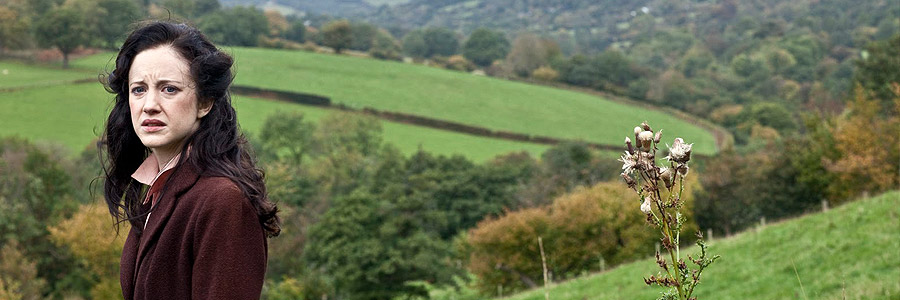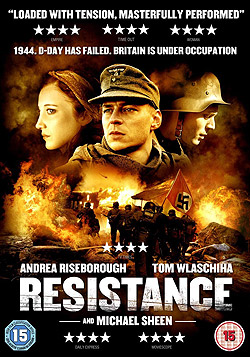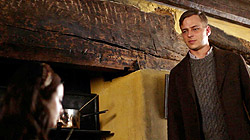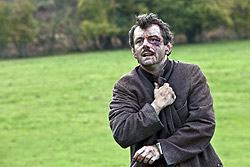
Resistance

RESISTANCE (DVD)
Metrodome Group
Release date: March 19th 2012
Certificate (UK): PG
Running time: 92 minutes
Country of origin: Wales
Original language: English, German
Director: Amit Gupta
Writers: Amit Gupta, Owen Sheers
Cast: Andrea Riseborough, Tom Wlaschiha, Alexander Doetsch, Sharon Morgan, Iwan Rheon, Michael Sheen
It’s easy to have principles when everything is going really well. To stand up and say you’d do ‘the right thing’ is no problem at all when in the back of your mind you know you won’t ever have to. When it comes to the crunch, it’s much more difficult to stand up for what you believe in.
If it made life so much easier, would you give up and go along with it? What if it meant the difference between life and death? Could you resist the lure of an easy life?
Resistance takes us to a Welsh valley, to 1945, five years after an unsuccessful D-Day landing. Britain is now occupied by Nazi forces with fighting on-going in London, Birmingham and Manchester.
In the remote farming community, there isn’t any front-line fighting. One morning though, the women of the village wake to find their husbands, fathers and brothers have left without a trace. In no time at all, German soldiers have occupied the village.

The film then follows the remaining villagers and the soldiers, exploring how they approach the occupation, what they really believe in, and how they choose to keep on living.
Sarah (Andrea Riseborough) is young and recently married, very much struggling with the disappearance of her husband Tom. Being beautiful, she catches the eye of the occupying soldiers, none more so that the Captain Albrecht (Tom Wlaschiha) and the two begin a friendship made uneasy by the questions that no one can answer. What if Sarah’s husband were to return? What if Steiner (Alexander Doetsch) tells on them? What if Albrecht’s superiors came to the village? Can she forgive him for his side of the war?
Sarah and Albrecht form a friendship out of the void. They are both lonely and troubled and find solace within each other. From having no other choice, they find a mutual comfort that they keep going back to, even though they are both conflicted. Sarah in particular is torn between enjoying her new company, thanking him for his help with the sheep during the winter, and reviling him for his actions during the war.
Gupta depicts their relationship with walks on the hill, quiet favours and stolen glances. This was poignant and to watch and invoked a sense of loneliness, but it never fully engaged my attention. The investments in confidence between the two didn’t seem to lead to anything substantial, and the plot was too slow-moving. Whether I wanted to root for a happy ending or be moved by a wrenching tragedy was beside the point because I got neither.

The set-up for the narrative was potentially fascinating, it’s a very good idea, but it didn’t seem fully formed in it’s execution. It wasn’t very emotionally charged, it wasn’t very exciting, it wasn’t action-packed or psychologically tense, or even an in-depth character study.
In one scene, Albrecht brings a record player to Sarah’s house. He plays a record, and the two stand and listen to the music. Sarah begins to cry, and says that she knows what he is, what he has done. This scene is affecting because it’s the culmination of ignoring the bigger issues, and keeping a tunnel-vision as a coping mechanism. Listening to music is a luxury, one that Sarah can’t let herself enjoy from Albrecht. She cries, and says that she knows who he is, she knows what he has done. He takes the record player away, denied of his redemption by the unwelcome reality check that neither of them can forget what is happening outside of the house.
But Gupta doesn’t take the scene far enough. He begins to scratch away at the surface, but doesn’t follow through with his premise. This scene didn’t elicit any emotion from me. I felt like I should have been crying too, or cheering Sarah on for rejecting his gift, and I grew frustrated at the lack of an emotional outlet.

I was much more interested in George (Iwan Rheon), who I felt had much more of a moral, rather than personal, dilemma to grapple with. His personal resistance was more apparent on screen, and his character had more of an arc with Tommy (Martin Sheen), but this story had much less screen time.
George’s idea of the right thing to do is opposed by Maggie’s (Sharon Morgan). Both are trying to get by unscathed by their conscience, and the futility of war is typified by one fateful action in the woods. The acting performances were fine, Riseborough stood out in particular, but it wasn’t enough to bring a lacklustre narrative to life.
The cinematography suffered similarly to the plot too. The Welsh valleys were both staggeringly beautiful in parts and immensely dull in others. Gupta didn’t use it to his full potential, and perhaps in an effort to keep his movie realistic and understated, it became boring. During scenes of dramatic action, the film often went silent. Gupta used flashbacks and slowed the action right down, but instead of feeling super intense it felt a bit disruptive, being another boundary that stopped me from really getting involved in the film.
Resistance gave enough to pique my interest, too much for me to overlook characters and themes, but not enough to satisfy me. There is a good story in this movie but it hasn’t been dug out, and it’s easy to shrug off because it’s not a film that stayed with me afterward. The lengthy silences, mournful stares and static landscape shots don’t make use of a strong cast, and it veered into melodrama. Resistance was a film that had a lot of ‘almost but not quite’s, and unfortunately didn’t live up to it’s premise.

Frances Taylor
Frances likes words and pictures, regardless of media. She finds great comfort and escape in film, and is attracted to anything character-driven with a strong story. Through these stories, she will find meaning in the world. Three movies that Frances thinks are really good for this are You and Me and Everyone We Know (Miranda July), I’m A Cyborg, But That’s OK (Chan-Wook Park), and How I Ended This Summer (Alexei Popogrebsky).
When Frances grows up, she would like to write words and make pictures and have cool people recognise her on the street and tell her that they really enjoy her work.
She can be found overreacting and over-caffeinated on Twitter @penny_face, a childhood moniker from her grandmother owing to her gloriously round face.
© 2012 STATIC MASS EMPORIUM . All Rights Reserved. Powered by METATEMPUS | creative.timeless.personal. | DISCLAIMER, TERMS & CONDITIONS
HOME | ABOUT | CONTACT | TWITTER | GOOGLE+ | FACEBOOK | TUMBLR | YOUTUBE | RSS FEED
CINEMA REVIEWS | BLU-RAY & DVD | THE EMPORIUM | DOCUMENTARIES | WORLD CINEMA | CULT MOVIES | INDIAN CINEMA | EARLY CINEMA
MOVIE CLASSICS | DECONSTRUCTING CINEMA | SOUNDTRACKS | INTERVIEWS | THE DIRECTOR’S CHAIR | JAPANESE CINEMA

 Please wait...
Please wait...


